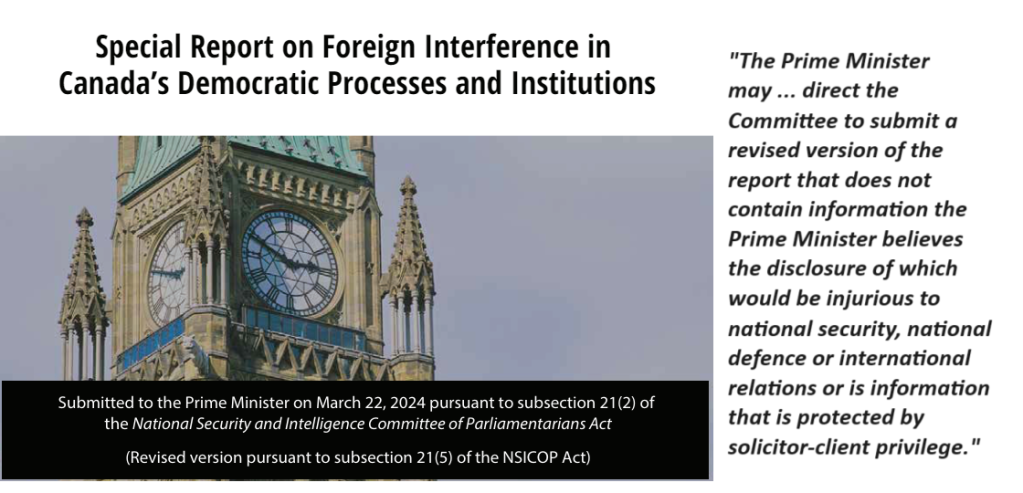Last week’s release of the Special Report on Foreign Interference on Canada’s Democratic Processes and Institutions (known as the NSICOP report) raises far more questions than it answers. However, a few sentences invite scrutiny with respect to a domestic matter. The report indicates that while China is the primary concern, “India’s foreign interference efforts have slowly increased, … [extending] beyond countering what it perceived as pro-Khalistani efforts in Canada.” The emphasis is mine. Such wording speaks to an ongoing objective of our present government; that of presenting the issue of Khalistan as India’s much-ado-about-nothing.
Khalistani-inclined Canadians are not shy about publicly demanding that a homeland be fulsomely carved out of India. Even though, as explained by Terry Milewski through The Faulkner Show, the heartland of Sikhism lies in Pakistan. Referenda have taken place (with more to come) in Canada, for Canadians to vote for the dissolution of India. (Our politicians might recall Canada’s fury in 1967 when Charles de Gaulle launched into “Vive le Québec libre.”) And recent years have seen an increasingly violent tone associated to the Khalistani-cause.
“Assassination wanted,” accompanied by images of Indian diplomats stationed in Canada, was the message emblazoned on a billboard situated outside a Sikh temple in Surrey last year. That billboard did not go unnoticed by Reuters and other international sites. Prior to that, a bounty had effectively been placed on those diplomatic heads; $10,000 was offered for their home addresses. The only visible Canadian response then was a cryptic remark from Foreign Affairs Minister Mélanie Joly regarding “promotional materials.”
Equally alarming is the spectacle of Khalistani supporters praising those who assassinated former Indian Prime Minister Indira Gandhi. That assassination was celebrated last year in Brampton and last week in Vancouver; as reported by Anirudh Bhattacharya for Hindustan Times, the float in Vancouver “featured an effigy of Indira Gandhi, showing her riddled with bullets including through the forehead and also displayed her assassins [with] guns pointed towards her.”
Gandhi’s assassination is part of a complicated history that began before Indian independence in 1947. Yet what would be a footnote in that history is a terrible chapter in Canada’s own story. For the goal of Khalistan, a man by name of Talwinder Singh Parmar had sufficient sanctuary in Canada to plot and implement terrorism. In June 1985, bombs were placed on two Air India flights traveling from Canada to India; one bomb detonated on the ground in Tokyo killing two baggage handlers, the other off the coast of Ireland killing all 329 aboard. By far, the majority of the victims were Canadians of Indian origin, including over 80 children. India had tried very hard to warn Canada, but those words fell on disinterested ears.
Inexplicably, Canadian politicians routinely attend events where Parmar is celebrated as a martyr. This does not have to descend into a debate about Freedom of Expression; instead, Members of Parliament could exercise their own rights in that regard and object to any glorification of Canada’s worst mass murderer. MPs could refuse to attend such events. And MPs could, and should, denounce the resurgence of extremism in Canada. We have already paid too high a price for Khalistan.
Returning to the NSICOP report, we are told that “India has an active proxy, who has proactively looked for ways to further India’s interests by monitoring and attempting to influence politicians.” Without transparency, we have little hope of knowing exactly what that means. But some of India’s interests can be gleaned from the joint statement issued during Prime Minister Trudeau’s trip to India in 2018. “Based on the fundamental principle of respect for sovereignty, unity and territorial integrity of the two countries,” Canada and India resolved to “combat terrorism and violent extremism in all their forms and manifestations.”
Perhaps the Prime Minister has forgotten that resolve.
It seems unlikely that Canadians will ever be provided the full story about the NSICOP report. To be transparent with intelligence-gathering will almost certainly result in unwanted transparency of the gatherers. It would also more concretely reveal internal interference. As Terry Glavin writes: “NSICOP is not a Parliamentary committee, strictly speaking. It is not established by the House of Commons. NSICOP answers to the prime minister. The committee submits classified reports to the PMO which are later tabled in Parliament, usually with massive redactions. Last Monday’s report contains only what the Prime Minister’s Office allowed the report to contain.”
The report lists the various reasons why the Prime Minister might choose to prevent disclosure of information, including a concern for international relations.

With respect to India, it is so evident that this government would prefer no relationship at all. As to what the Prime Minister’s motivation is, there are only two possible reasons–either he genuinely believes that every Canadian of Indian origin is a Sikh longing for Khalistan, or, he has let his personal dislike of India become public policy. Neither is a good look for a Prime Minister. And it is Canada as whole that will suffer.
As has been discussed by various international centres (i.e. Chatham House, World Economic Forum, Brookings Institution, etc.) India is the world’s largest democracy, its economic and geopolitical stature is rising, and its relationship with the United States is deepening. Prime Minister Trudeau’s “Anti-India” stance is risky, but one has to turn to Indian media to be told that. For instance, from Firstpost:
Canada’s flirtation with Khalistan separatism comes with significant risks including alienating India and jeopardising potential trade opportunities. As India continues to ascend as a global economic powerhouse, Canada’s stance on Khalistan could have long-term repercussions for its diplomatic and economic interests. The fallout from this controversy could haunt Canada for years to come.
The irony is that this was all so unnecessary. There was a shared history between the two countries, one that could have grounded a better relationship. More to come another day.